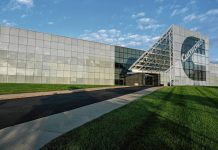With 50 years until its belt, Ivy Tech Community College in Columbus is focused on adapting to affect the future of students today and the next half-century.
For thousands of students, either right out of high school or to further their education as adult learners, Ivy Tech has provided a base education that has led to life-changing opportunities.
In its earliest days, credits from many courses didn’t transfer to other institutions, said Steven Combs, current chancellor of Ivy Tech in Columbus, who has spent 25 years working at Ivy Tech campuses across the state.
Now, Ivy Tech credits are accepted in more than 100 programs in Indiana and other states. Last year, more than 31,000 students transferred into other programs after studying at one of the statewide Ivy Tech campuses.
[sc:text-divider text-divider-title=”Story continues below gallery” ]
“You can start here and go there and know you don’t have to repeat courses,” Combs said. “I don’t know that any two-year college in Indiana has that grassroots approach like Ivy Tech.”
Four years after the launch of Indiana Vocational Technical College in 1963, its Columbus region was organized and commissioned on June 20, 1967 with campuses in Columbus and Bloomington.
Course offerings at Columbus in 1968 when the college’s board of trustees reached an agreement with then-Mayor E.M. Kline for temporary accommodations in four rooms of the old Columbus City Hall at Fifth and Franklin streets.
Daytime classes were offered at City Hall while evening classes were offered at Cummins Engine Co. The first Ivy Tech class offered in Columbus was Technical Math I, taught in the fall of 1968 by Edward Pelic, a Cummins test engineer.
The college’s name evolved in 1995 when it became Ivy Tech State College.
Today, Ivy Tech’s Columbus campus works to ensure its academic programs are relevant to residents of the four counties it serves while focusing on supporting the local workforce, Combs said.
Under the leadership of Ivy Tech president Sue Ellspermann, the Indianapolis-based community college system has developed a five-year strategic plan to better focus campuses and sites to serve their individual communities and align academic programs with the needs of area employers for high-demand and high-wage careers, Combs said.
Ivy Tech, which has a current enrollment of about 2,400 students in Columbus, serves regional individuals in Bartholomew, Decatur, Jackson and Jennings counties and has community-based sites in Greensburg, North Vernon and Seymour.
“The new strategic plan provides the campus and its leadership with more autonomy in our Columbus service area to partner with other education providers and employers to ensure a seamless pathway from high school through higher education and into the workforce,” Combs said.
While the appeal of Ivy Tech to adult learners remains, the college is becoming more popular with recent high school graduates, said Randy Proffitt, vice chancellor for enrollment services at Ivy Tech’s Columbus campus.
“More families are becoming knowledgeable about the extremely affordable pathway we offer to those seeking a bachelor’s degree or a well-paying career in a high-demand field,” Proffitt said.
Ivy tech today
Proffitt said Ivy Tech has always had its fingers on the pulse of the communities it serves and has adapted programs to workforce demands and needs, which benefits communities and students.
In the past few years, the campus has started programs in robotics, engineering and cyber security, said Proffitt, who has worked at Ivy Tech for 23 years.
The school added a flight training program a year ago that allows students to learn how to fly through a partnership with Jeff Air, the fixed-based operator at the Columbus Municipal Airport.
The campus opened its Toyota Industrial Equipment Welding Laboratory at the college’s Agriculture Industrial Technology Center on Grissom Street in September after receiving a $367,800 donation from TIEM.
Columbus manufacturer NTN Driveshaft has also developed a partnership with Ivy Tech for its advanced automation and robotics program.
Through the program, NTN Driveshaft has been able to hire a number of interns who receive tuition reimbursement each year they attend Ivy Tech, said Barry Parkhurst, NTN vice president of administration. Students also have the opportunity to become an NTN employee upon graduation.
“That program is good for making students ready for careers in advanced manufacturing,” Parkhurst said. “We can train them specific to our needs.”
Parkhurst, a member of the Bartholomew County Manufacturing Education Partnership, said the program has been beneficial for students and NTN Driveshaft in that it allows individuals to ensure they have made the right choice while helping the company fill positions.
He added that NTN Driveshaft also works with local high schools, including the Columbus Area Career Connection program, to make students aware of the opportunity.
“It’s something we try to use as a meter to make the Ivy Tech program more successful,” Parkhurst said.
Students draws
Current Ivy Tech students have their own reasons for choosing the campus to pursue their studies.
Elizabeth Westerfeld of Batesville, who has studied business at Ivy Tech for two years, said she decided to attend the community college since it is easy for her to work and attend classes simultaneously.
Between proximity to her home and the flexibility to take online classes, she said Ivy Tech has been a good launching point for her post-secondary education.
Mandy Flowers of Greenwood, who is in her second year working toward an associate degree in graphic design, chose Ivy Tech in part due to the affordability of tuition.
Flowers, who earned a bachelor’s degree in art from Grace College five years ago, credited her Ivy Tech instructors.
“They have real-world experience,” Flowers said.
Curtis Cronin came to Ivy Tech after studying at Marian University for a year and a half. The Greensburg resident made the switch since he felt he wasn’t getting the necessary hands-on experience he needed.
Now, Cronin is on track to earn his associate degree in graphic design in December and is also job-shadowing with Fat Atom, a marketing and graphic design firm in Carmel.
New building looms
Looking ahead, Combs said the Columbus campus has been ranked first on a priority list among all its statewide campuses for capital projects. The Columbus campus expects to hear back from the state legislature in the first quarter of 2019 about funding, he said.
Ivy Tech is proposing a $29 million project that calls for a two-story, 80,000-square-foot building to replace Poling Hall, which opened in 1983 and would be razed.
If approved, a capital campaign would be launched to pay for equipment inside the new building, Combs said.
Ivy Tech has sought funding twice before in recent years for capitol improvements in Columbus. The college submitted a request for $25 million five years ago, then $16.9 million a year ago, but other projects were deemed to have a higher priority.
Combs said the proposed new building would allow the Ivy Tech campus to offer a modern space that would better ensure student preparedness and success.
“We want to do something that’s architecturally interesting,” Combs said. “The new space will allow us to upgrade our healthcare, information technology, business, visual communications and general studies program classrooms and labs while at the same time provide a space where students and employees can create a community of learners.”
Combs added that Ivy Tech is committed to maintaining the legacy of the current building and the Poling name while at the same time providing an opportunity for future collaborators to come aboard.
During Proffitt’s 23 years with Ivy Tech, he has seen arrival of the Columbus Learning Center in 2005 and the Advanced Manufacturing Center of Excellence in 2010.
Those two buildings, located near Ivy Tech in the Columbus AirPark, have become cornerstones of the campus and helped Ivy Tech expand its programming in the areas of engineering and robotics, Proffitt said.
“We have come a long way from our roots when we offered a handful of classes in downtown Columbus,” Proffitt said. “Ivy Tech has grown to become the largest community college system in the country, and our impact to the students and communities we serve are immeasurable.”
[sc:pullout-title pullout-title=”Ivy Tech timeline” ][sc:pullout-text-begin]
1967: Indiana Vocational Technical College Region 10 formally organized and commissioned on June 20, 1967. The region includes campuses in Columbus and Bloomington.
1968: Eugene Hall appointed first Region 10 director. College reaches agreement with Columbus Mayor E.M. Kline for temporary Ivy Tech accommodations in four rooms of City Hall at Fifth and Franklin streets with day classes beginning there and evening classes at Cummins Engine Co.
1969: Spring non-credit enrollment in Columbus includes tech math II, 11 students; physics, 13 students; power systems, 9 students; and architectural drafting, 119 students. Credit enrollment began in the fall for 76 students, most aspiring to receive a technical certificate or a certificate of completion. Along with its certificate programs, Region 10 began offering two-year programs in drafting and secretarial science designed to lead to an associate of applied science degree.
1971: Ivy Tech moves from City Hall into the Armory Building at 646 Franklin St., a 23,678-square-foot, two-story building built in 1928. The building housed administrative offices, classrooms and laboratories for electronics, secretarial science, accounting, computer programming and heating, ventilation and air conditioning. First three Region 10 graduates received their associate of applied science degrees during a June 16, 1971 commencement ceremony at North Christian Church in Columbus.
1973: Campus leases the Prall House at 2518 E. 17th St. for the practical nursing and respiratory therapy programs.
1975: Ivy Tech purchases a two-story frame house next to the Armory Building on Franklin Street, which housed the Learning Resources Center and faculty offices.
1977: Ivy Tech acquires three more leased facilities — the Buchanan Building on Franklin Street, which was used for the commercial art program and the drafting program; two adjacent buildings at 1410 Jackson St. to house the college’s automotive service program; and 1402 Jackson St. to expand the automotive service program to include a diesel power area of study.
1978: Region leases a building at 1402-30 Sycamore St. for its photography program, the building construction and medical assistant programs. Community interest begins to develop for a new shared facility for Ivy Tech and IUPUI Columbus, later to become IUPUC.
1981: Indiana General Assembly approves a new $4.5 million Ivy Tech Columbus facility at 4475 Central Ave., with construction to begin the next spring.
1983: The Harvey S. Poling Jr. Instructional Center, an 81,000-square-foot facility that brought together Ivy Tech administrative and support office, classrooms and labs for many program areas that had been scattered across the community in six buildings, debuts with an Aug. 7, 1983 open house. It was named after the region’s first dean and vice president and was rededicated Dec. 9, 2011 as Poling Hall.
1995: Gov. Evan Bayh signs a bill changing the college name from Indiana Vocational Technical College to Ivy Tech State College.
2001: Regional boundaries are redrawn for the first time in Ivy Tech’s history. The Bloomington region was formed and the Columbus region continued serving its part of the state.
2005: The Columbus Learning Center, a 123,000-square-foot space shared by Indiana University, Purdue University and Ivy Tech, opened Sept. 16 on the Columbus Municipal Airport AirPark, becoming the first shared-use facility among these entities in the state.
2018: Ivy Tech Columbus marks its 50th year.
Source: Ivy Tech Community College
[sc:pullout-text-end]




